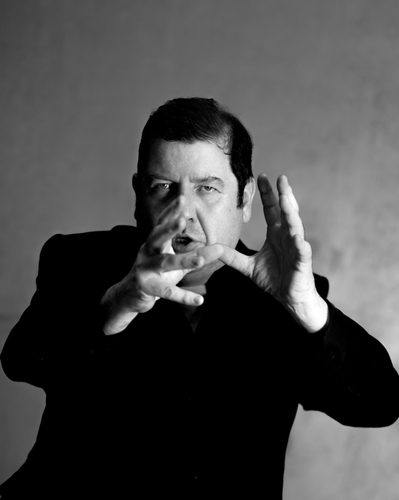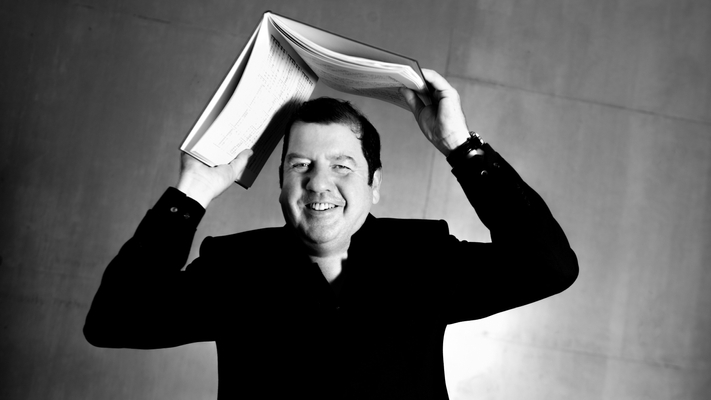A Lot of Questions
News |
Mozart! I think about you so often. About your works, about interpretations and how one can, may and should approach you. Not so much in inner conversations with you, as I do today, but mostly about the matter itself, about your music.
Such a conversation begins with the question: How should I address you? Can I say "you"? Perhaps I'd rather not. Although I feel closely connected to your music, you remain on a pedestal, so in my mind you are not Wolfgang, but Mozart.
And yet, may I be very personal for a moment? Would you like to know how I imagine you? There have been so many images of Mozart over the centuries - sometimes you are shown a gentlemanly rococo wolf, sometimes an exalted genius. Around 200 years after your death, an English playwright called Peter Shaffer wrote a play about you and Salieri, which was very successfully filmed - "filmed": I'll explain what that means later - anyway, it was an almost cartoonish, wild Mozart, a child of the late 20th century. But what were you really like? For me, you must have been an incredibly impatient person. How could it be otherwise? When you consider how incredibly many works you wrote in such a short period of time, plus the numerous trips across Europe - you had to be hyperactive, extremely busy and impatient to pack all that into one life. And, if your letters are to be believed, there was also a sense of career behind it. In contrast to others, such as Joseph Haydn, who stayed at the Esterhazy court for a very long time, you were less sedentary and didn't stay with anyone for very long. You were always driven on; there was definitely ambition behind it, wasn't there?
May I tell you something else? About my first contact with you ... I was about nine years old and listened to Don Giovanni - a record with Josef Krips. I knew very little of the opera repertoire and was overwhelmed by the originality of the score. And I soon discovered the secret of masterpieces in my prolonged study of your compositions. The deeper you delve into a work, driven by the spirit of research, the more you want to know. You discover parallels to other pieces, to other composers - special features. And that continues to this day, this desire to research and to always be able to find something new.
Do you know what I often imagine? The historical performance situation. I try to imagine being one of the artists who were there at the first performances. Because it would undoubtedly be incredibly enriching to experience a work in its historical context - in one of the theaters that no longer exist, in the old Burgtheater on today's Michaelerplatz in Vienna, for example. I imagine myself in one of these spaces and ask myself: What did it sound like? What were the acoustics like?
Of course, you'll never know, but just thinking about these questions helps us move forward and is of course part of the preparation for a performance today. Because what is it all about? To show respect for the composer by trying to get as close as possible to his world of thought - even if our knowledge of historical performance culture is patchy. But if I imagine that I had to conduct one of your operas while you were listening to me - that would be incredibly exciting. I would be nervous, very nervous. After all, composers are the creators of the work, and we performers are only the ones who perform it. Of course, we contribute our creativity and artistry, but nevertheless, you and your colleagues created the great works. That's why composers are somewhat elevated for me in a way. I can remember what it was like when I premiered a work by one of your later colleagues, Heinz Holliger. Everyone involved was extremely excited, because everyone wanted him to be satisfied ..
I don't know if anyone from the 18th century could imagine how we make music today. May I describe it to you? We play an incomparably larger repertoire than in your time - but much fewer premieres and much, much less music from the present day.
What we perform is music from more than 400 years ago; most of the repertoire dates back centuries. It was different in your time. The musicians didn't have this long view into the past back then - more or less only contemporary music, music from the last few decades, was played. It was a different situation in terms of style and technique. Because all the musicians played one style and were completely at home in it; there was a kind of common musical mother tongue.
I am also addressing you because I will soon be conducting your Entführung aus dem Serail at the Vienna State Opera. The work was created in the course of the idea of a national singspiel, which was born by Emperor Joseph II. I have thought a lot about the extent to which the idea of enlightenment - the educational aspect that was important to the Emperor - is reflected in the Abduction.
On the one hand, of course, you can say that his entire Singspiel project was not a great success. It didn't last long; almost all the works that were created are no longer known in my time. And yet, the project shows the ruler's great interest in culture, music and the Enlightenment. Incidentally, this can also be seen in the development of the character of Bassa Selim - from the Western stereotype of a cruel Ottoman ruler to a character who ultimately embodies positive values such as forgiveness.
But who am I telling! You composed the work. Am I right? Were these the concerns of the time? You intervened in the libretto, which proves to me what a theatrical and dramatic instinct you have.
But did you think that what you write would become immortal? Just one example among many: The quartet Belmonte, Konstanze, Pedrillo, Blonde at the end of Act 2 captivates me every time. These far-reaching motivic and harmonic developments! This unfolding of a multitude of musical characters. In my opinion, this quartet is one of the most progressive pieces composed in an operatic context up to this point - i.e. 1782. Perhaps only similar passages from La finta giardiniera and Idomeneo are comparable.
And in this finale, in the andantino passage "Wenn unsrer Ehre wegen", I am always fascinated by how the individual characters are able to express different emotions at the same time. How did you feel when you wrote that? You later took these complex finales to the extreme in your famous septet in Le nozze di Figaro. When we play the quartet today, time always stands still for a moment. This unique combination of musical beauty and the emotional expression of the individuals reflecting on the situation - did time also stand still when you composed it?
Or Konstanze: Like many others, you would have drawn her as an unambiguous character who only loves her Belmonte. But you created a multi-dimensional character who is not just black or white, but fluctuates. This makes the story much more exciting. And you can hear this fluctuation in her music; you can sense that she is not entirely averse to Bassa Selim either.
I would like to return to the historical performance situation: What did the old Burgtheater sound like, where not only Die Entführung aus dem Serail, but also Le nozze di Figaro and Così fan tutte were premiered? Was the building acoustically perfect for these operas? Or were there already questions of balance back then - not only between the orchestra and the ensemble of singers, but also within the orchestra?
We are quite concerned about that today. Because when I conduct a work like Die Entführung at the Vienna State Opera, it is undoubtedly a larger and, above all, higher-ranking venue than the historic Burgtheater. But here in Vienna, in the State Opera, the distance between the stage and the stalls is not that great - it's much more challenging, for example in some American houses.
I would be interested to hear what you have to say about these contemporary theaters. Would you write new, completely different operas?
One more thing: is it true that Joseph II said after the Abduction: "A lot of notes, dear Mozart"? I keep asking myself whether this isn't just an apocryphal story. My explanation for the sentence is that Joseph II meant it quite differently, namely in the opposite sense. In comparison to the numerous works of poorer quality that were written at the time - operas that were weaker in orchestration, paler in color and expression - there were certainly a lot of notes.
Perhaps Joseph II was simply surprised, astonished? Did he simply not expect such a complex and rich work? Did you really answer as boldly as the story goes: "Just as many notes, Your Majesty, as are necessary"? Was it possible to speak to emperors like that? Or did you have a special status with him?
I apologize for asking so many questions - but as I said earlier, the deeper you delve into a matter, the more you want to know. And if you want to come and listen: from October 12 at Haus am Ring! The cast will inspire you, if I may say so myself ..

